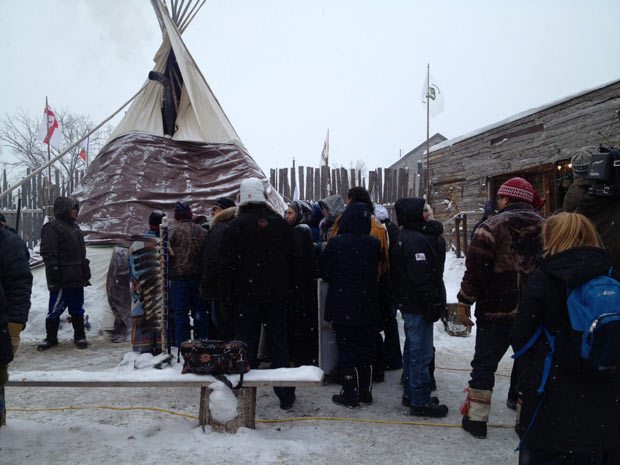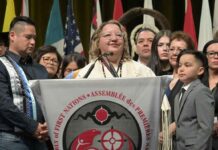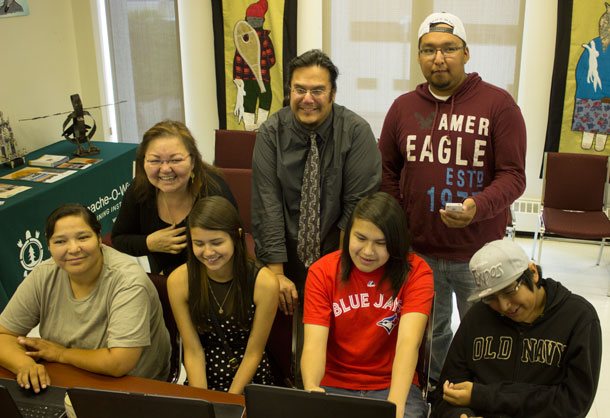
THUNDER BAY – Leaders Ledger – We want to acknowledge all First Nation and non-First Nation citizens for raising awareness with respect to the plight of our people and for working with us to demand change and a more promising future for us all. We recognize and support Chief Theresa Spence for her commitment to bringing greater attention to the challenges that First Nations are confronted with and the need for the federal government to work with First Nation leaders.
As a result of these efforts, a meeting involving the Prime Minister and First Nation leaders has now been set for January 11, 2013 in Ottawa. This meeting must be the start of a dialogue that will result in a plan to restore the Nation-to-Nation relationship and the full implementation of the Treaties.
Throughout the past half century, First Nation leaders and our peoples have fought the 1969 White Paper, constitutional proposals, and an onslaught of paternalistic legislation and policy that attempted to terminate us as Indigenous Peoples. The federal government continues to make decisions for us regardless of our opposition and the fact that these unilaterally imposed changes impact upon our constitutionally protected rights. This approach is based on the colonialist belief that we are not capable of directing our own future.
Indigenous Nations of Turtle Island have always been organized, self-governing societies. We have developed and operated Nation and community governance structures and economies, which included alliances between Nations and trade relations. In keeping with this understanding, the term Inherent Jurisdiction confirms that we are self-governing Nations and that we have occupied this land now known as Canada prior to the arrival of settlers. The settlers to this land acknowledged the existence of Indigenous Nations by entering into Treaties on a Nation-to-Nation basis. Our Inherent rights and Jurisdiction were not created by external governments, nor is it necessary for external governments to recognize our Inherent authority for us to exercise it.
The Supreme Court of Canada has been clear that the federal government must honour the duty to consult and accommodate First Nations when a proposed action may infringe upon Aboriginal, Inherent or Treaty rights. What this means is the federal government must meet with First Nations prior to making any policy or legislative changes on issues that affect First Nations.
We, as First Nations, must continue to advocate for our right to our free, prior and informed consent. For more information on the principle of free, prior and informed consent please see the following websites: www.forestpeoples.org (Guiding Principles) or www.nan.on.ca (Requirement for Free, Prior and Informed Consent).
The two omnibus budget implementation bills put forward by the federal government, known as Bill C-38 (passed by Parliament in June 2012) and the more recent Bill C-45, included measures that impact First Nations Aboriginal and Treaty rights. Bill C-45 was made law on December 14, 2012 and is the lightning rod that has galvanized First Nations people from coast to coast. The federal government failed to honour its duty to consult with First Nations with respect to either bill. This approach once again laid bare the arrogance and disrespect this government has not only for the rights of First Nations but for transparency and accountability to all Canadians.
Many years ago the Indian Act was imposed on us and since that time we have argued against it while at the same time trying to operate as best we can under it.
This has led to the situation that we find ourselves in today. Now is the time to start the conversation about how we move away from the Indian Act in a planned and well-thought out manner.
The meeting scheduled for January 11, 2013 between First Nation leaders and the Prime Minister must be the start of a dialogue that leads to tangible progress for our peoples. The meeting cannot simply be a public relations exercise for the federal government. Many are viewing this meeting as a make or break meeting that must result in a clear commitment to a joint process that will focus on the development of concrete plans addressing those matters that are of priority to First Nations.
There is a role for all of us to create the change we want. Many years of colonization have brought us to where we are and it will take a concerted effort by all of us to fully reclaim our places as autonomous Nations within our homeland.
It is through working together that we will achieve our goals.
Ontario Regional Chief Stan Beardy
Grand Chief Gord Peters, Association of Iroquois and Allied Indians
Grand Council Chief Patrick Mahdabee, Anishinabek Nation
Ogichidaa Warren White, Grand Council Treaty 3
Grand Chief Harvey Yesno, Nishnawbe-Aski Nation
Grand Chief Mike Mitchell, Mohawks of Akwesasne
Chief Bill Montour, Six Nations of the Grand River
Grand Chief Stan Louttit, Mushkegowuk Council



